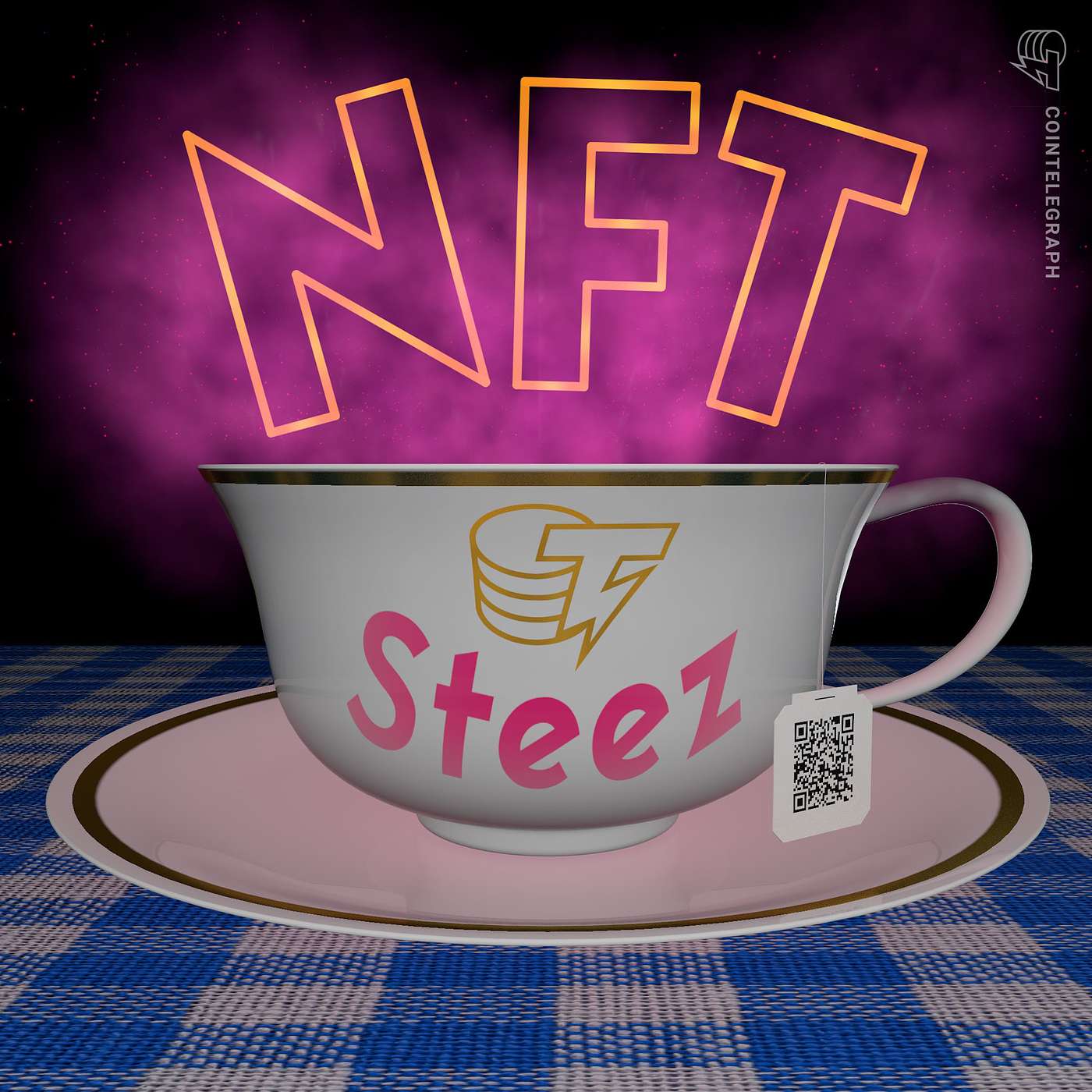In this episode of Decentralize with Cointelegraph, join host Gareth Jenkinson in an in-depth discussion with Arthur Hayes, co-founder of BitMEX and CEO of Maelstrom. They explore the implications of the recent US Federal Reserve interest rates cut on traditional finance and crypto markets, dive into the intricacies of Japanese yen carry trades, and discuss Bitcoin market dynamics. Hayes also shares his thoughts on the impact of Bitcoin ETFs and the evolving crypto regulatory landscape, with insights from his extensive experience in the industry.
Follow Cointelegraph on X @Cointelegraph.
Follow this episode’s host, Gareth Jenkinson on X at @gazza_jenks.
Timestamps:
(00:00) - Introduction to the episode.
(00:39) - Fed rate cut, its impact on traditional markets, reactions and predictions.
(03:11) - Yen carry trades and the impact on crypto.
(04:11) - Athena protocol and Hayes’ perspective on market resilience.
(05:28) - Bitcoin ETFs, institutional involvement, and the impact on the crypto market.
(06:58) - Opportunities in derivatives trading.
(07:57) - Hayes’ support for Bitcoin development.
(08:44) - Impact of the Bitcoin halving and AI competition on Bitcoin mining.
(10:24) - Reflection on legal challenges in 2022, and the implications of running a centralized crypto company.
(11:47) - Potential impact of US politics on crypto regulation.
(13:16) - Transition to Maelstrom and the differences from running BitMEX.
The views, thoughts and opinions expressed in this podcast are its participants’ alone and do not necessarily reflect or represent the views and opinions of Cointelegraph. This podcast (and any related content) is for entertainment purposes only and does not constitute financial advice, nor should it be taken as such. Everyone must do their own research and make their own decisions. The podcast’s participants may or may not own any of the assets mentioned.
‘It sucked’ — Arthur Hayes on BitMEX saga, Fed cuts, Bitcoin ETFs, yen carry-trades
Transcript
[00:00:09] Gareth Jenkinson: This episode of Decentralize with Cointelegraph features an exclusive interview with Maelstrom founder Arthur Hayes. Join me, your host, Gareth Jenkinson, in this fascinating discussion with the former CEO of BitMEX as he unpacks historic rate cuts in the United States, his outlook for crypto markets, his ongoing support of the Bitcoin core ecosystem, and his honest reflection of his conviction for bank secrecy violations while he was at the helm of BitMEX.
[00:00:39] Gareth Jenkinson: All right. Arthur Hayes, it’s great to meet you.
[00:00:41] Arthur Hayes: You, too.
[00:00:42] Gareth Jenkinson: Great to chat to you here in Singapore. I really enjoyed your chat yesterday.
[00:00:45] Arthur Hayes: Thank you.
[00:00:46] Gareth Jenkinson: And you jumped on stage and, you know, led with, it’s f-ing Fed Day, and everyone loved it. That’s now come and passed. They announced what you expected, you know, 50-point rate cut. Was it what you expected in terms of, you know, TradFi markets and crypto markets, the reaction?
[00:01:00] Arthur Hayes: I think it’s calm before the storm, obviously. So, I don’t know when this is airing, but I woke up this morning, I took a look at the announcement. You know, half a percent rate cut. I took a look at dollar/yen. It was like 142, a little bit weaker. I think, just before I stepped in here, it’s almost like 144, so weakening slightly. Bitcoin’s up, I don’t know, 1% or 2% post the announcement. But strangely enough, the 10-year Treasury yield is actually up two or three basis points from the announcement. So, I think that’s an interesting sort of dichotomy about the market. You would think that yields would come down even further, because I think now, for the November meeting, it’s almost like a 70% chance the market believes that the Fed is going to cut again at least 25 basis points. So, I think it’s too early to tell. It would be very interesting to see how crypto trades over the weekend once TradFi closes, because for what seems to happen is you get the initial reaction, and then the real reaction is going into the close on Friday for TradFi markets, and then crypto follows up either up or down over the weekend. And so that’s when we really see what the market really thinks about what just happened.
[00:02:03] Gareth Jenkinson: I mean, you had a pretty like cataclysmic sort of prediction, I think about a week ago. I mean, no one can predict the markets perfectly, but are you surprised just how everything kind of played out, actually, after the announcement?
[00:02:13] Arthur Hayes: I mean, obviously, I have a macro view that Jay Powell and Janet Yellen want to use financial markets to help Kamala Harris win the election. And obviously this sort of fits within that thesis. Because if you look at the US economy, it’s extremely strong. GDP growth third-quarter this year was about, I think, two-point-something percent positive real growth. There’s still unemployment. It’s still quite low on historical standards. And why is the Fed cutting rates? It seems like the current rate regime was perfectly fine with a growing US economy. So, what was so bad that they needed to cut a half a percent, largest rate cut since March of 2020? I believe that they’re trying to get markets to go even higher, to make people feel even wealthier as they go into the ballot box in November, and inflation is going to accelerate after this point, because if people have been saying that the US government has been recklessly spending money, how does making it cheaper for them to borrow help that position?
[00:03:10] Gareth Jenkinson: Yeah, yeah. You spoke a lot on stage yesterday about the yen carry trade. How does this influence that? And how do you see the influence of the yen carry trade on crypto markets in particular? I mean, obviously, our audience is very keen on the crypto side.
[00:03:22] Arthur Hayes: Yeah. So, I think that the yen is going to continue to strengthen. And if the Fed and the market believes they’re going to continue to cut rates, and the BOJ has continued to say we are still on a rate-rising path, so that differential is going to narrow over time. If you are in a leveraged yen carry trade, you need to be exiting that trade because both sides of the pond are telling you, on the one hand, we’re cutting rates in the US dollar side, and on the Japanese yen side, we’re going to raise rates. So, it’s imprudent for risk management for you to keep that position on. So I believe that slowly then quickly, people are going to be selling foreign assets, foreign meaning assets outside of Japan, and buying back the yen because they need to cover this trade because it’s going to go against them, I think, in a big way over the near term.
[00:04:07] Gareth Jenkinson: I’m going to switch it up to kind of more crypto-focused topics. I don’t know if you saw yesterday, you’ve been pretty bullish on Athena, they had like a... Their site was compromised, and they switched off the website. Just in terms of the uncertainty that this can bring, you know, we’ve got very new sort of products hitting the market that are doing very interesting things. Does it worry you that these kind of things happen and, you know, as an investor or someone that’s playing around in these markets, is it like, damn, when this stuff happens, I get a bit nervous, and maybe it’s too soon for people to jump in, like hard with a lot of capital?
[00:04:35] Arthur Hayes: So I’ve been trading crypto for over a decade now. I obviously was running BitMEX for a period of time, and we’ve experienced all sorts of different types of outages. Obviously, the biggest one was the March 2020 DDoS attack when the exchange went down. And, you know, people thought we saved Bitcoin from going to zero or whatnot. But again, these things happen, right? There are malicious actors who are looking to take down especially front-ends and trick people into sitting their assets where they shouldn’t be going. And at the end of the day, it’s incumbent upon the protocols to make sure the actual base technology is safe. The Athena protocol is, we reassure people that the actual funds that are staked with the protocol are unaffected. This is purely a front-end issue. This is part and parcel of dealing with electronic, you know, things, right? And I guess we find out what happens when you have a pager or a walkie-talkie. So, nothing’s safe.
[00:05:25] Gareth Jenkinson: Yeah, careful what you put in your pocket, I guess. What are your general thoughts on Bitcoin ETFs that hit the market this year? Obviously, it’s had a huge role in where we’re at right now. Everyone’s had differing opinions. Most of it’s been pretty bullish. Do you think we’ve actually... Are we yet to see the actual impact of Bitcoin ETFs and a much bigger capital inflow to these markets now?
[00:05:46] Arthur Hayes: So quite an interesting phenomenon has happened with these Bitcoin ETFs. If you look at, I think it’s the 13F filing in the US where large funds have to disclose their holdings on a quarterly basis, you saw the top of the list were institutions like Millennium, large hedge funds, right, who owned all of these Bitcoin ETFs. Now, a lot of people think, oh wow, Izzy believes that Bitcoin is valuable. But that’s not the case. They were putting on basis trades. So these large funds would buy the Bitcoin ETF and sell the CME futures contract, and earn a very good return, I don’t know, whatever the basis was at the time. And so, as that basis has come in, as the Bitcoin price has fell and gone sideways for the past six months, you started seeing these institutions selling Bitcoin ETFs in the cash market. And that’s kind of why you saw sort of net outflows over the past few weeks. So it’s going to be interesting to see the next quarter’s disclosures on whether those who are at the top are now much lighter positions as they’ve unwound these trades. So I think we’re yet to see sort of like a lot of true long-only buying that isn’t influenced by sort of interest rate trades that are endogenous to the crypto ecosystem. Once we see that, then I think we’re going to see a lot stronger sort of base case for bullishness for Bitcoin ETF asset accumulation.
[00:06:58] Gareth Jenkinson: You also, you cut your teeth obviously as a derivatives trader when you’re a little bit younger. I find it fascinating that these products have hit the market, and most retail investors are just looking to invest in some Bitcoin, right? But it seems like a very green field with a lot of opportunity for knowledgeable traders and firms to make a lot of money when you have these complicated products coming in, and like you say, people are buying the Bitcoin ETF and then selling a futures contract somewhere else. It does seem like if you know what you’re doing, it’s still a very green field to make a lot of money. Is that the right assumption?
[00:07:28] Arthur Hayes: Yeah, so I think if you have a fund or you have the ability to have accounts both in like the TradFi ecosystem and in like DeFi, Web3 and crypto decentralized exchanges, there’s so many discontinuities in terms of flows, right? Millennium can’t trade on Binance, but they can trade on the CME, right? So you’re going to see price dislocations. Retail investors can’t trade on a lot of the US products, so that flow is gone from those markets. And so those who are able to play in both sides are going to be able to make a lot of money doing very, very simple and easy things.
[00:07:57] Gareth Jenkinson: Maelstrom recently awarded its first Bitcoin developer, you know, investment. Are you a Bitcoiner at heart? Do you feel like you still have a very big vested interest there? And why are you supporting Bitcoin Core?
[00:08:08] Arthur Hayes: So, I mean, Bitcoin is the original OG coin, right? It’s why we’re all here. It’s the hardest money ever known. It’s the reserve asset of crypto. So I think as Bitcoin goes, the ecosystem goes, right? If Bitcoin goes to $1 million, and alts are going to go to some crazy, crazy values. If we don’t support the Bitcoin network and don’t support the folks who are updating Bitcoin Core, and we allow the state to take down this thing that we’ve built, then we’re all at risk of bad things happening to the ecosystem. So I think it’s incumbent upon those who can afford to do so to support developers who are devoting their time and energy to upkeeping the thing that started this whole movement.
[00:08:43] Gareth Jenkinson: Do you keep tabs on the industry in depth? I mean, I’ve been to Bitcoin, Amsterdam, I’ve been to many different conferences. I’ve spoken to a lot of OG Bitcoiners. People are still very divided about making, you know, layer 2s and giving Bitcoin better sort of payment functionality. And then, you know, people like Jameson Lopp, who are very open about it being quite ossified, Bitcoin as a network, and perhaps just maintaining that and letting it be what it is. I don’t know what your thoughts are on that.
[00:09:09] Arthur Hayes: I think that if Bitcoin wants to be the hardest money ever known, then upgrades have to be slow, right? Because the last thing we want to do is put something into production that’s going to endanger what we’ve spent the last 15 years building. Nor do I believe that Bitcoin needs to stay the same, right? The whole point is that it changes with how people want it to change, but obviously in a slow and methodical and safe way.
[00:09:30] Gareth Jenkinson: Your thoughts on the Bitcoin halving this year? It seems like a narrative that no one’s really talking about. Is it important that there’s a lot less supply coming into the market, especially since we have things like Bitcoin ETFs that are literally gobbling up as much Bitcoin as they have to serve the market?
[00:09:44] Arthur Hayes: I mean, of course, the deflationary or disinflationary impacts of the halving will be felt when the market’s ready for them to be felt. Maybe it’s not now. Maybe it’s in a month or two. I don’t know. I think one of the bigger concerns for miners right now is you now have this competition for AI data centers, right? There is this insatiable demand for power and for compute from training large language models, LLMs. And so now, if you’re a Bitcoin miner and you have access to this power and you have a data center, you could do Bitcoin mining, you could do, you know, AI training, right? And so you kind of… It’s going to be interesting to see how that plays out in terms of the economics for large-scale Bitcoin mining.
[00:10:19] Gareth Jenkinson: Well, a lot of the companies have already diversified. They’re like serving this market serving that market. It’s a very great place to be. I wanted to take you back to 2022. Obviously, you pled guilty to US Bank Secrecy Act violations. You had home detention, two years of probation and a $10 million fine. What was that whole experience like for you? And when you look back in retrospect, was it a small price to pay to push back against some of the very sort of draconian regulatory approaches of the US in particular?
[00:10:46] Arthur Hayes: I mean, it sucked. It wasn’t. It wasn’t fun. I’m not going to lie. I wish it didn’t happen. I think it’s part and parcel of running a centralized company in crypto, right, is facing more serious sort of things. And he spent four years in jail, which obviously is no fun.
[00:11:02] Gareth Jenkinson: Four months. But I mean, it’s still a long time.
[00:11:04] Arthur Hayes: There’s been, you know, you have Ross serving a life sentence. You have other people who’ve fallen afoul of US regulation. So, I think if you run a centralized company in crypto, these are the sorts of things that can happen to you. It also shines a light on what the centralization actually means. Like, we have a lot of these centralized companies. They’re subject to these sorts of risks. If that’s not something that you’re comfortable with, then you might need to choose a different line of work.
[00:11:27] Gareth Jenkinson: I do want to shift into politics. I don’t know how strong your views are on this, but obviously, the SEC has had the crypto industry in its crosshairs for quite a long time now. Everyone from, you know, Consensys to OpenSea have had lawsuits filed against them. Do you think things might change if there is a change in government at the end of the year and you see a Trump presidency? Or do you think a Harris presidency would just be more of the same for another four years?
[00:11:51] Arthur Hayes: I find it quite strange that a lot of people in crypto think that Trump is pro-crypto. Trump was president for four years. He had perfectly, you know, a blank slate to do whatever he wanted to do, and he did nothing for crypto. A lot of the people who are in these agencies, you know, came in under a Trump administration. So I don’t believe anything he says. He’s a politician. There’s a lot of crypto money that wants to donate to politics. He’s happy to take it and tell you what you need to hear. In terms of Harris and the Democrats, you know what they’re about. You’ve seen the last four years in terms of the policies that have been put forward. But I think at the end of the day, the United States is a very small place in terms of population. Obviously, it has a very large economy and whatnot. But take a look at this conference, right? Last year, I think they sold 10,000 tickets. This year, they sold 20,000 tickets. So there’s a global movement to get financial freedom, to divorce money from the state. And if the American regulators want to try to keep everybody out of their little pond, that’s fine. Let them do that. That’s, you know... But at the end of the day, we’re going to move forward. We don’t need regulatory clarity from the United States government. If they provide it, great. If they don’t, it’s just the same as it’s been since 2009. And we’ve grown from zero to whatever, $2, $3 trillion market cap of a crypto ecosystem. So I think people need to stop worrying about it. If you want to launch a business in the US, then obviously, you need to worry about those things. But if you’re constrained about what do I do, then just ignore America. There’s a whole wide world out here. Look at this conference. It’s absolutely insane the amount of energy and people from all around the world have come here to sort of build a bright new future. Let America be in the past.
[00:13:16] Gareth Jenkinson: The last question. You’ve moved on to Maelstrom now. How much of a change of pace was that from BitMEX, and are you enjoying it?
[00:13:23] Arthur Hayes: So I mean, BitMEX was fun. Obviously, I made a lot of money. I’m still on the board. I still own, I haven’t sold a single share of what I own in BitMEX. Running a 250-person company, not really my jam. It’s a lot of things in HR and, you know, being the CEO that I didn’t really enjoy. And so having the opportunity to work with a very small group of dedicated financial professionals, investing and trading and trying to make money, is a lot more enjoyable for me. And so I really love what we’re doing at Maelstrom and the people that I work with. It’s a lot of fun. I love financial markets. I love talking about them. I love writing about them. I love investing in projects. So, I’m having a blast at Maelstrom.
[00:13:59] Gareth Jenkinson: Fantastic. Arthur, thanks so much for your time. It was good to finally meet you, and hopefully, we see you in Europe in a few months’ time as well. Thank you.
[00:14:05] Arthur Hayes: Thank you.
[00:14:06] Gareth Jenkinson: Thank you.
Highlights
(00:39) - Fed rate cut, its impact on traditional markets, reactions and predictions.
(03:11) - Yen carry trades and the impact on crypto.
(04:11) - Athena protocol and Hayes’ perspective on market resilience.
(05:28) - Bitcoin ETFs, institutional involvement, and the impact on the crypto market.
(06:58) - Opportunities in derivatives trading.
(07:57) - Hayes’ support for Bitcoin development.
(08:44) - Impact of the Bitcoin halving and AI competition on Bitcoin mining.
(10:24) - Reflection on legal challenges in 2022, and the implications of running a centralized crypto company.
(11:47) - Potential impact of US politics on crypto regulation.
(13:16) - Transition to Maelstrom and the differences from running BitMEX.
Episodes
Crypto’s real-world adoption in 2025 and what builders should expect in 2026
2025 was a year of major shifts for crypto and not just in headlines, but in what actually matters for builders: fundamentals, real-world use cases and sustainable revenue.
In this episode of Byte-Sized Insight, we are joined by Leonard Dorlöchter, co-founder of peaq, to break down what quietly worked in 2025 and what the industry should be paying attention to in 2026. Leonard explains how DePIN began gaining real traction, why “fundamentals started mattering more,” and how the industry may be maturing while also losing sight of Web3’s original decentralization ethos.
The conversation also explores the rise of AI agents and robotics, new standards for machine-to-machine coordination, and what it could look like when devices, machines and autonomous agents begin transacting onchain as part of a global machine economy.
(1:58) Leonard introduces peaq and the “machine economy”
(4:03) 2025 shift: fundamentals and real revenue start to matter
(5:24) Web3 maturity vs. losing the decentralization ethos
(7:33) Blockchain as neutral global infrastructure and governance layer
(10:45) 2025 breakthroughs: physical AI and new standards for agents
(12:18) Why machine coordination is moving onchain
(13:31) Breaking down “machine economy” onchain vs offchain
(14:01) Example: tokenized machines, peer-to-peer energy, shared ownership
(17:51) Trust, reputation and efficiency in an open-machine economy
(20:23) Real-world adoption: robot in production in Hong Kong, onchain rewards
(22:06) 2026 outlook: robotics protocols, onchain goods/services, sovereign agents
(25:12) Policy gap: regulation progress but not fully aligned with Web3 ethos
(28:42) Why peaq partnered with VARA, machine economy free zone sandbox
(30:12) Builder advice for 2026: validate value, traction and real revenue
This episode was hosted and produced by Savannah Fortis, @savannah_fortis.
Follow Cointelegraph on X @Cointelegraph.
Check out Cointelegraph at cointelegraph.com.
If you like what you heard, rate us and leave a review!
The views, thoughts and opinions expressed in this podcast are its participants alone and do not necessarily reflect or represent the views and opinions of Cointelegraph. This podcast (and any related content) is for entertainment purposes only and does not constitute financial advice, nor should it be taken as such. Everyone must do their own research and make their own decisions. The podcast’s participants may or may not own any of the assets mentioned.
Stablecoins took over crypto in 2025: Here’s what the data says about 2026 (feat. Chainalysis)
2025 marked a turning point for crypto not in price cycles or hype, but in how the industry is actually used, regulated and understood.
In this episode of Byte-Sized Insight, we’re joined by Matthias Bauer-Langgartner, Head of Policy for Europe at Chainalysis, to break down what really happened in crypto in 2025, using data, not headlines.
We dig into how 2025 became the year of the stablecoin, how stablecoins now dominate on-chain activity and crypto crime, why illicit crypto flows surged even as adoption went mainstream and how crypto crime has taken on a more geopolitical dimension. The conversation also goes into how regulators, particularly in Europe, have matured in their approach, what MiCA changed on the ground and what crypto companies should be preparing for as they head into 2026.
You don’t want to miss it!
(00:08) Welcome to Byte-Sized Insight + 2026 series kickoff
(01:20) Introducing Matthias Bauer-Langgartner and Chainalysis
(03:47) Where the global crypto industry stands in January 2026
(04:40) On-chain growth and the rise of stablecoins
(05:58) Stablecoins overtake Bitcoin in transactional volume
(09:02) Why regulators focus on stablecoins first
(11:06) Institutional adoption and MiCA’s impact in Europe
(13:18) Are European regulators more confident after 2025?
(17:38) Who really has leverage in crypto now?
(19:49) Crypto Crime Report 2025: record illicit flows
(21:44) Nation-state crypto crime and sanctioned stablecoins
(23:17) Why stablecoins dominate illicit activity and why that matters
(28:15) Top policy, crime, and security trends for 2026
(32:10) Cybersecurity, DORA, and real-time on-chain monitoring
(34:27) Advice for crypto companies entering Europe in 2026
This episode was hosted and produced by Savannah Fortis, @savannah_fortis.
Follow Cointelegraph on X @Cointelegraph.
Check out Cointelegraph at cointelegraph.com.
If you like what you heard, rate us and leave a review!
The views, thoughts and opinions expressed in this podcast are its participants alone and do not necessarily reflect or represent the views and opinions of Cointelegraph. This podcast (and any related content) is for entertainment purposes only and does not constitute financial advice, nor should it be taken as such. Everyone must do their own research and make their own decisions. The podcast’s participants may or may not own any of the assets mentioned.
UK crypto regulation is coming: Inside the FCA’s sweeping new consultation
The UK is taking a major step toward fully regulating crypto markets.
This week on Byte-Sized Insight, we break down the Financial Conduct Authority’s sweeping new consultation covering crypto exchanges, staking services, lending, and decentralized finance and what it could mean for the future of the UK crypto industry.
We’re joined by Perry Scott, Head of UK Policy at Kraken and Chair of the UK Cryptoasset Business Council, to unpack what’s actually new in the proposals, why the October 2027 timeline matters and whether regulatory clarity could make the UK more competitive globally.
(00:00) Welcome to Byte-Sized Insight
(00:45) UK launches sweeping crypto consultation
(03:20) Why this is a turning point for UK crypto
(05:00) Perry Scott on the scale of the proposals
(06:45) The 2027 timeline: “the firing gun has been fired”
(08:20) UK vs EU vs US: second-mover advantage
(09:45) Market structure and global liquidity
(11:05) Staking gets bespoke rules
(12:20) Crypto lending: from bans to guardrails
(13:35) How the FCA is approaching DeFi
(15:10) Will regulation drive firms offshore?
(17:20) What comes next for UK crypto
This episode was hosted and produced by Savannah Fortis, @savannah_fortis.
Follow Cointelegraph on X @Cointelegraph.
Check out Cointelegraph at cointelegraph.com.
If you like what you heard, rate us and leave a review!
The views, thoughts and opinions expressed in this podcast are its participants alone and do not necessarily reflect or represent the views and opinions of Cointelegraph. This podcast (and any related content) is for entertainment purposes only and does not constitute financial advice, nor should it be taken as such. Everyone must do their own research and make their own decisions. The podcast’s participants may or may not own any of the assets mentioned.
Can ESMA Fix MiCA?: Europe regulated crypto first, now it considers a central regulator
Europe was the first major region to roll out a comprehensive crypto framework, but now it’s rethinking how that framework is enforced.
In this episode of Byte-Sized Insight, we break down the European Union’s proposal to centralize crypto supervision under the European Securities and Markets Authority (ESMA), a move that would shift oversight of crypto-asset service providers away from national regulators and toward a single EU-level authority.
To understand what’s happening on the ground, we speak with Dr. Lewin Boehnke, chief strategy officer at Crypto Finance Group, who offers a rare perspective from both Switzerland’s mature crypto market and the EU’s newly regulated one. He explains why MiCA’s overall approach makes sense, where technical details are slowing adoption and why centralizing supervision under ESMA could actually help reduce friction rather than create it.
(1:55) Europe moves to centralize crypto oversight under ESMA
(4:58) Why MiCA’s rollout has been slow, and why that’s not surprising
(5:24) Switzerland’s head start on institutional crypto adoption
(6:38) Why MiCA’s focus on regulating intermediaries makes sense
(7:48) The MiCA Article 75.6 ambiguity slowing banks down
(9:09) Why Europe’s quieter regulatory approach may be a long-term strength
(10:13) Uneven MiCA enforcement across Germany, Luxembourg, and Malta
(12:26) What Europe should prioritize in crypto regulation over the next year
This episode was hosted and produced by Savannah Fortis, @savannah_fortis.
Follow Cointelegraph on X @Cointelegraph.
Check out Cointelegraph at cointelegraph.com.
If you like what you heard, rate us and leave a review!
The views, thoughts and opinions expressed in this podcast are its participants alone and do not necessarily reflect or represent the views and opinions of Cointelegraph. This podcast (and any related content) is for entertainment purposes only and does not constitute financial advice, nor should it be taken as such. Everyone must do their own research and make their own decisions. The podcast’s participants may or may not own any of the assets mentioned.
The first U.S. state to buy Bitcoin: Why is Texas going all in?
Texas just became the first US state to purchase and hold Bitcoin, and it did so during a market downturn, while many institutions and state treasuries were selling or backing away from crypto entirely.
In this episode of Byte-Sized Insight, we break down alongside Lee Bratcher, founder and president of the Texas Blockchain Council, why Texas made a $5 million Bitcoin ETF purchase (with another $5 million earmarked for self-custodied BTC), how a years-long political history set the stage and what this move means for US crypto policy.
Is Texas making a bold strategic play or taking on unnecessary risk? And could this be the spark that reignites the conversation around Bitcoin in public finance?
(00:08) Texas becomes the first U.S. state to purchase and hold Bitcoin
(00:33) Why Texas buying Bitcoin during a downturn matters
(02:28) Texas’s long-term Bitcoin thesis and the significance of the timing
(03:38) Greg Abbott’s early Bitcoin advocacy: 11 years before Texas’s buy
(04:54) Abbott on Texas becoming a global hub for Bitcoin and blockchain
(08:05) Why Texas is treating Bitcoin as a multi-decade strategic asset
(09:34) How Texas’s Bitcoin purchase could influence other U.S. states and policymakers
(11:13) Texas’s energy, finance, and demographic advantages in Bitcoin adoption
(12:55) Closing insight: Texas and Bitcoin as long-term partners beyond market cycles
This episode was hosted and produced by Savannah Fortis, @savannah_fortis.
Follow Cointelegraph on X @Cointelegraph.
Check out Cointelegraph at cointelegraph.com.
If you like what you heard, rate us and leave a review!
The views, thoughts and opinions expressed in this podcast are its participants alone and do not necessarily reflect or represent the views and opinions of Cointelegraph. This podcast (and any related content) is for entertainment purposes only and does not constitute financial advice, nor should it be taken as such. Everyone must do their own research and make their own decisions. The podcast’s participants may or may not own any of the assets mentioned.
Crypto turbulence in 2025 explained: A practical guide to navigating market volatility
The crypto markets have been battered over the past several weeks with Bitcoin sinking from six-figure highs to the low-$80Ks, more than a trillion dollars wiped from crypto’s total market cap and record ETF outflows shaking investor sentiment. Unlike previous drawdowns triggered by blow-ups or bad actors, this downturn is different: It’s macro-driven, liquidity-driven and deeply tied to broader global markets.
In this episode of Byte-Sized Insight we hear from the author of “Crypto is Macro Now,” Noelle Acheson; co-founder and CEO of LO:TECH, Tim Meggs; and author of “The Crypto Trader,” Glen Goodman, to help break down the forces behind the volatility and offer clear, grounded perspective for navigating the turbulence.
(0:24) Bitcoin plunges from $120K to $80K and the market wipes out $1.2 trillion
(1:08) Why this downturn feels different from past crashes
(2:55) Noelle Acheson explains why the dip is “a blip” and liquidity-driven
(3:52) How macro sentiment, not crypto-specific issues, is driving this correction
(4:59) Why this drawdown isn’t systemic like 2017 or 2022
(6:03) Bitcoin dominance drops during the downturn and why that’s never happened before
(7:38) Noelle breaks down “short-term noise vs. long-term debasement thesis”
(10:28) Tim Meggs: Why this drawdown is slow, measured, and institution-driven
(12:05) Inside the market: What liquidity providers look for during stress
(13:22) Signs of stabilization and why healthy corrections matter
(15:41) Glen Goodman: How institutional money changed the structure of crypto cycles
(20:34) Why today’s downturn lacks a narrative and why that weakens crypto rallies
(23:04) Survival rules: managing leverage, mental resilience & “reduce to the sleeping point”
This episode was hosted and produced by Savannah Fortis, @savannah_fortis.
Follow Cointelegraph on X @Cointelegraph.
Check out Cointelegraph at cointelegraph.com.
If you like what you heard, rate us and leave a review!
The views, thoughts and opinions expressed in this podcast are its participants alone and do not necessarily reflect or represent the views and opinions of Cointelegraph. This podcast (and any related content) is for entertainment purposes only and does not constitute financial advice, nor should it be taken as such. Everyone must do their own research and make their own decisions. The podcast’s participants may or may not own any of the assets mentioned.
Authors
About podcast
The Decentralize with Cointelegraph podcast covers all things Web3 and cryptocurrency, from challenges facing the industry to breaking news and in-depth dives into the culture of BTC, Ethereum and Web3. Experience crypto news like never before with the Decentralize with Cointelegraph podcast.
Other podcasts
Disclaimer These podcasts (and any related content) are for entertainment purposes only and do not constitute financial advice, nor should they be taken as such. Everyone must do their own research and make their own decisions. The podcasts' participants may or may not own any of the assets mentioned.


.png)




